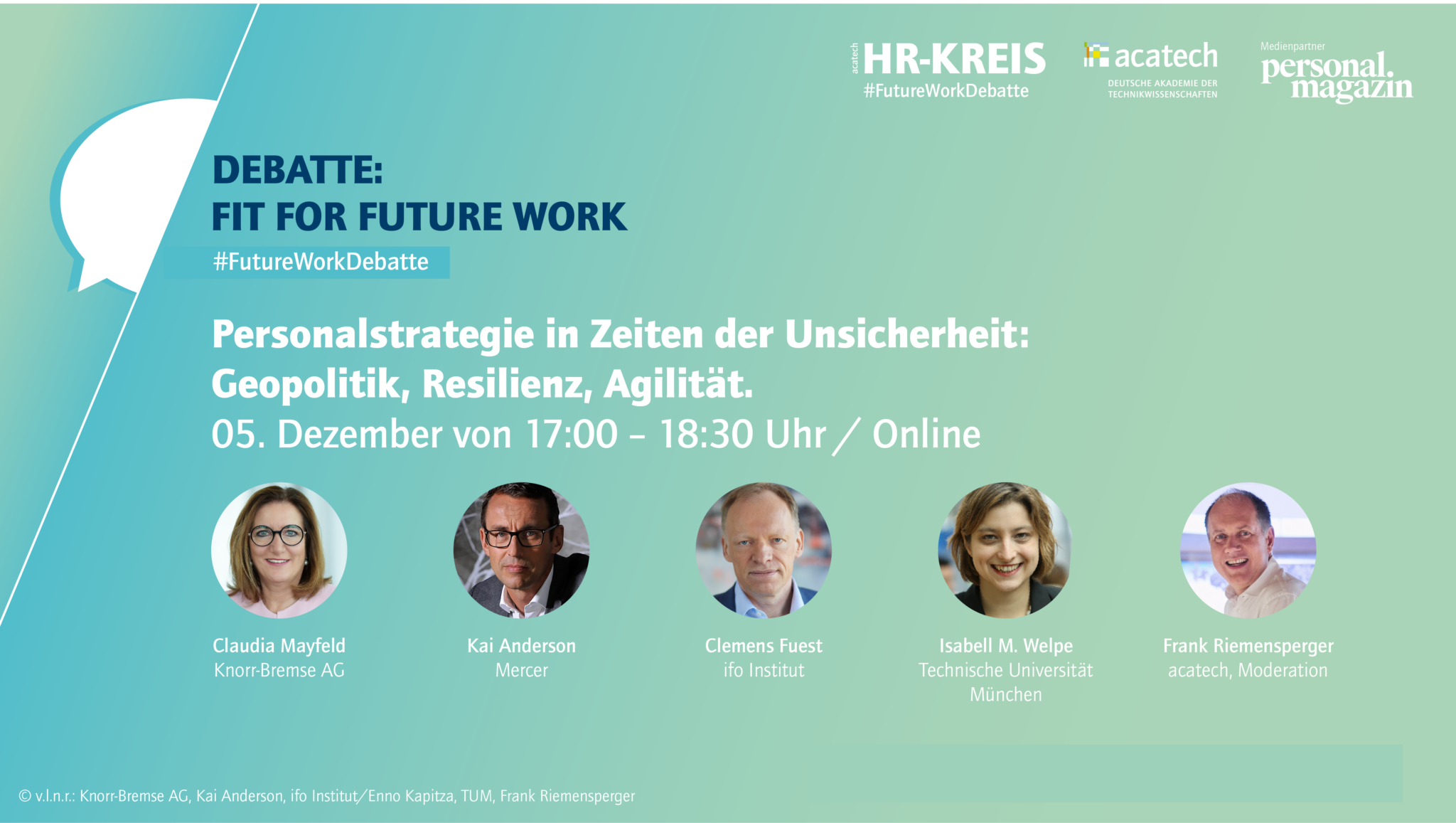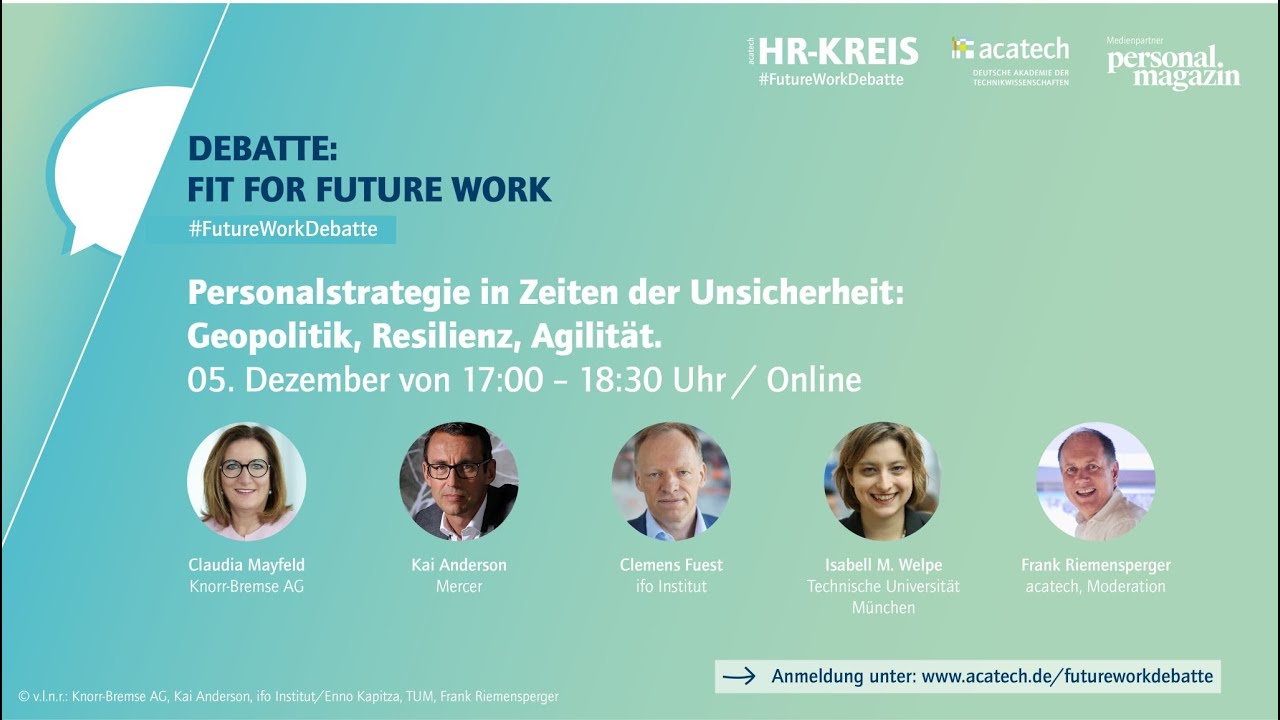#FutureWorkDebatte: Strategic human resource planning – the new ”supreme discipline of HR”?

Munich, 14 December 2023
In times of great uncertainty, resilience and agility are key factors for companies. At the #FutureWorkDebatte on 5 December, host of acatech’s Human Resources Working Group Frank Riemensperger spoke with guests from science and business about why strategic human resource planning is becoming increasingly important in this regard. This was the final edition of the virtual event series in 2023.
Artificial intelligence, climate change, regional wars with global consequences – the current phase of world history is a time of upheaval and uncertainty. This also affects decision-makers within companies: the question is how organisations can develop the resilience to master the geopolitical and technological challenges of our times. Strategic human resource planning can provide the key here, as, with the right personnel, a company can react to crises with greater flexibility, and adapt.
Claudia Mayfeld, member of the Executive Board of Knorr-Bremse AG with responsibility for HR, also expressed this point of view at the #FutureWorkDebatte held on 5 December. A company that operates globally like Knorr-Bremse must constantly ask itself how it can attract and retain talent. Given the skills shortage that exists, retention is the new hiring in many areas. Kai Anderson, Global Workforce and Organizational Transformation Lead International at Mercer, concurred. He emphasised the increased importance of strategic human resource planning, describing it as the “supreme discipline” of HR. According to Kai Anderson, “the talent pipeline” has to be managed in the same way as the “conventional” supply chain in industry.
Isabell Welpe, Professor of Strategy and Organization at the Technical University of Munich, pointed out that “generative AI” has recently added a whole new dimension to the transformation: as a result of this technology, some aspects of work will have to be reconfigured, job requirements will change significantly and certain work activities will be eliminated. The question that almost all companies are therefore asking themselves at the moment is “How will AI affect productivity and how will productivity gains be distributed?”
The panel agreed that executives have a special role in managing the processes of adaptation – another area where strategic personal resource planning can help. Executives must develop suitable strategies, and in doing so, they must involve employees and set an example of embracing change. To be able to fulfil this role, however, they also need the backing of top management. Clemens Fuest, President of the ifo Institute, also put the onus on (political) leaders: especially in times of uncertainty, they must provide more guidance by setting realistic goals – for instance with regard to the digital or green transformation of the economy and companies. If citizens or employees come to the conclusion that goals are unrealistic, credibility will quickly be lost – as will people’s motivation to get involved in achieving the defined goals.
The participants in the debate also agreed that there must be a certain degree of agility and breathability in Human Resources. This is not something that can be developed ad hoc; it is part of strategic human resources planning. The aim is to be able to react flexibly in any given situation using the company’s existing personnel – past crises have already shown that this can work.
“Coping in this age of polycrisis requires joint action on the part of companies and the government and the effort of society as a whole. This is the only way we can make good progress on the path of transformation,” said moderator and Human Resources Working Group host Frank Riemensperger, summing up the final FutureWorkDebatte of 2023. The next debate will take place on 11 March 2024. Further information is available here.
Recording of the event (in German)
About the debate series Fit for Future Work
Current proposals from acatech’s Human Resources Working Group are zeroing in on how a good working relationship can work and how digitalisation can go from bugbear and suspected job-killer to an opportunity for good work. In its debate series “Fit for Future Work” the Human Resources Working Group puts forward its perspectives for public discussion. The latest information and positions surrounding the debate series are available on social media:
#FutureWorkDebatte




